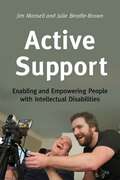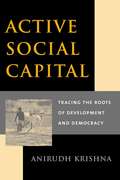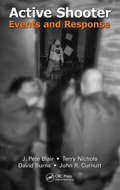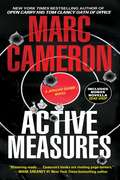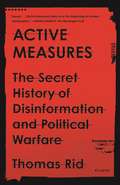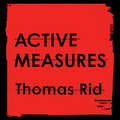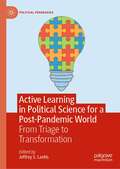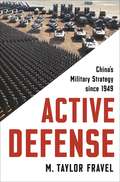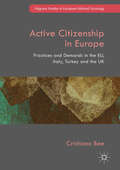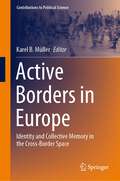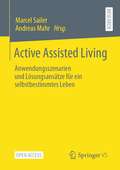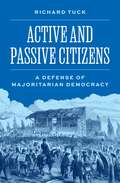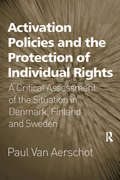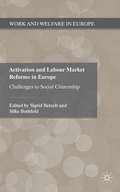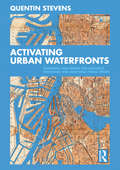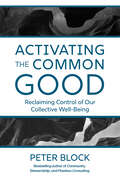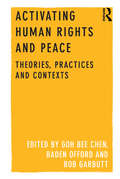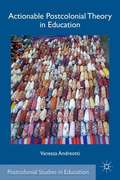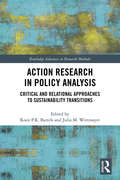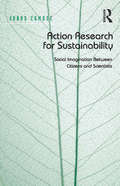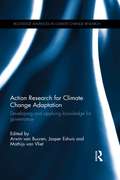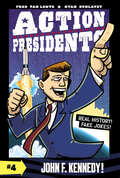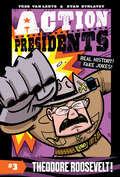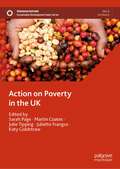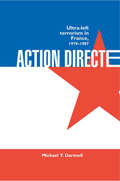- Table View
- List View
Active Support
by Julie Beadle-Brown Jim MansellActive Support is a proven model of care that enables and empowers people with intellectual disabilities to participate fully in all aspects of their lives. This evidence-based approach is particularly effective for working with people with more severe disabilities, and is of growing interest to those responsible for providing support and services. The authors provide a comprehensive overview of Active Support and how it can be used in practice, based on the theory and research underpinning the methods involved. They describe how to engage people with intellectual disabilities in meaningful activity as active participants, and look at the communication style needed to foster positive relationships between carers and the people they are supporting. Highlighting the main issues for those trying to put Active Support into practice, they explain what is needed on a day-to-day basis to support the implementation, improvement and maintenance of the approach, along with possible solutions for the difficulties they may encounter. Finally, they look at how to integrate Active Support with other person-centred approaches, drawing on examples from various organisations and individual case studies. The definitive text on Active Support, this book will be essential reading for anyone professionally concerned with the quality of life of people with intellectual disabilities, including psychologists, behaviour specialists, social workers, care managers, occupational therapists and inspectors and regulators of services, as well as families.
Active Social Capital: Tracing the Roots of Development and Democracy
by Anirudh KrishnaThe idea of social capital allows scholars to assess the quality of relationships among people within a particular community and show how that quality affects the ability to achieve shared goals. With evidence collected from sixty-nine villages in India, Krishna investigates what social capital is, how it operates in practice, and what results it can be expected to produce. Does social capital provide a viable means for advancing economic development, promoting ethnic peace, and strengthening democratic governance? The world is richer than ever before, but more than a fifth of its people are poor and miserable. Civil wars and ethnic strife continue to mar prospects for peace. Democracy is in place in most countries, but large numbers of citizens do not benefit from it. How can development, peace and democracy become more fruitful for the ordinary citizen? This book shows how social capital is a crucial dimension of any solution to these problems.
Active Shooter Events and Response
by John P. Blair Terry Nichols David Burns John R. CurnuttThe Columbine tragedy on April 20, 1999 began a new era in law enforcement as it became apparent that the police response to such mass shootings must be drastically altered. By the time the Sandy Hook Elementary School shooting occurred on December 14, 2012, outdated police response strategies had been replaced with new, aggressive tactics used by
Active Measures (A Jericho Quinn Thriller #8)
by Marc CameronOLD ENEMIES NEVER DIE Cuba and the United States are in talks to normalize relations, something the old guard on the Communist-controlled island has vowed to stop—by any means necessary. Zayda de la Guardia, a rogue general in the Cuban security services, has gotten his hands on a nuclear weapon left over from the Cold War. He plans to launch it on Miami, an attack that could kill millions. There&’s just one thing standing in his way: special agent Jericho Quinn and his team have traveled undercover to Cuba to unravel de la Guardia&’s plot before it ignites a nuclear holocaust. Thrown into a secret prison, pursued by assassins, and trapped on the tiny island during one of the worst hurricanes of the century, Quinn and his crew must survive a trial by fire to prevent an international confrontation that would make the Cuban Missile Crisis look like a fist fight. Praise for Marc Cameron&’s Open Carry &“Cameron, who has nearly three decades in law enforcement and a stint as a U.S. Marshal, keeps all the plot points delicately balanced and at the same time creates sympathetic heroes, depraved villains, and nail-biting action. Readers will eagerly await his next.&”—Publishers Weekly,STARRED REVIEW &“Cameron effectively combines investigation and straight-ahead action . . . a compelling, never-give-an-inch hero who will appeal to Jack Reacher fans.&”—Booklist
Active Measures: The Secret History of Disinformation and Political Warfare
by Thomas RidThis revelatory and dramatic history of disinformation traces the rise of secret organized deception operations from the interwar period to contemporary internet troll farmsWe live in the age of disinformation—of organized deception. Spy agencies pour vast resources into hacking, leaking, and forging data, often with the goal of weakening the very foundation of liberal democracy: trust in facts. Thomas Rid, a renowned expert on technology and national security, was one of the first to sound the alarm. More than four months before the 2016 election, he warned that Russian military intelligence was “carefully planning and timing a high-stakes political campaign" to disrupt the democratic process. But as crafty as such so-called active measures have become, they are not new. The story of modern disinformation begins with the post-Russian Revolution clash between communism and capitalism, which would come to define the Cold War. In Active Measures, Rid reveals startling intelligence and security secrets from materials written in more than ten languages across several nations, and from interviews with current and former operatives. He exposes the disturbing yet colorful history of professional, organized lying, revealing for the first time some of the century’s most significant operations—many of them nearly beyond belief. A White Russian ploy backfires and brings down a New York police commissioner; a KGB-engineered, anti-Semitic hate campaign creeps back across the Iron Curtain; the CIA backs a fake publishing empire, run by a former Wehrmacht U-boat commander, that produces Germany’s best jazz magazine. Rid tracks the rise of leaking, and shows how spies began to exploit emerging internet culture many years before WikiLeaks. Finally, he sheds new light on the 2016 election, especially the role of the infamous “troll farm” in St. Petersburg as well as a much more harmful attack that unfolded in the shadows.Active Measures takes the reader on a guided tour deep into a vast hall of mirrors old and new, pointing to a future of engineered polarization, more active and less measured—but also offering the tools to cut through the deception.
Active Measures: A History of Disinformation
by Thomas RidWe live in an age of organized deception. Spy agencies pour vast resources into hacking, leaking, and forging data, often with the goal of weakening the very foundation of liberal democracy: trust in facts. Thomas Rid, a renowned expert on technology and national security, was one of the first to sound the alarm. Even before the 2016 election, he warned that Russian military intelligence was "carefully planning and timing a high-stakes political campaign" to disrupt the democratic process. But as crafty as such so-called active measures have become, they are not new.In this astonishing journey through a century of secret psychological war, Rid reveals for the first time some of history's most significant operations - many of them nearly beyond belief. A White Russian ploy backfires and brings down a New York police commissioner; a KGB-engineered, anti-Semitic hate campaign creeps back across the Berlin Wall; the CIA backs a fake publishing empire, run by a former Wehrmacht Uboat commander that produces Germany's best jazz magazine.Rid tracks the rise of leaking, and shows how spies began to exploit emerging internet culture many years before WikiLeaks. Finally, he sheds new light on the 2016 US election, especially the role of the infamous "troll farm" in St. Petersburg, as well as a much more harmful attack that unfolded in the shadows. We live in strange times. Only the perverse logic of active measures can explain them.
Active Learning in Political Science for a Post-Pandemic World: From Triage to Transformation (Political Pedagogies)
by Jeffrey S. LantisThis book features valuable conversations about how COVID-19 has changed how we teach and even who we are as instructors in political science. This project devotes special attention to how our pedagogy in political science has evolved from ‘triage’ to transformation over the course of the pandemic. This book, part of the Palgrave Macmillan Political Pedagogies series, presents a variety of innovations in political science teaching (from “ungrading” to the flipped classroom) and offers systematic reflections on how our approaches to teaching and learning have been forever changed.
Active Defense: China's Military Strategy since 1949 (Princeton Studies in International History and Politics #167)
by M. Taylor FravelWhat changes in China’s modern military policy reveal about military organizations and strategySince the 1949 Communist Revolution, China has devised nine different military strategies, which the People’s Liberation Army (PLA) calls “strategic guidelines.” What accounts for these numerous changes? Active Defense offers the first systematic look at China’s military strategy from the mid-twentieth century to today. Exploring the range and intensity of threats that China has faced, M. Taylor Fravel illuminates the nation’s past and present military goals and how China sought to achieve them, and offers a rich set of cases for deepening the study of change in military organizations.Drawing from diverse Chinese-language sources, including memoirs of leading generals, military histories, and document collections that have become available only in the last two decades, Fravel shows why transformations in military strategy were pursued at certain times and not others. He focuses on the military strategies adopted in 1956, 1980, and 1993—when the PLA was attempting to wage war in a new kind of way—to show that China has pursued major change in its strategic guidelines when there has been a significant shift in the conduct of warfare in the international system and when China’s Communist Party has been united.Delving into the security threats China has faced over the last seven decades, Active Defense offers a detailed investigation into how and why states alter their defense policies.
Active Citizenship in Europe: Practices and Demands in the EU, Italy, Turkey and the UK (Palgrave Studies in European Political Sociology)
by Cristiano BeeThis book evaluates the role that civic engagement, political participation and active citizenship can play in promoting the establishment of a European polity. The chapters included here examine how the practice of active citizenship is managed and constructed in the context of a European drive to increase civic engagement and political participation in three member states (Portugal, Italy and the UK) and one accession country (Turkey). Looking at both processes and policies promoting active citizenship at the European and national levels, this book uncovers current discourses as well as political priorities and values that surround the activities of non- governmental organizations (NGOs). Of particular interest are debates about the nature and level of civic and political participation and engagement of marginal groups (women, youths, migrants and minorities) as they are particularly vulnerable to social exclusion. The book focuses on the interaction between institutions and civil society actors, addressing a number of questions related to their reciprocal role in influencing, shaping, criticising or disregarding certain political priorities. This book was published as a special issue of the Journal of Civil Society.
Active Borders in Europe: Identity and Collective Memory in the Cross-Border Space (Contributions to Political Science)
by Karel B. MüllerThis book explores how identities, public spheres and collective memories are being transformed in cross-border areas, contributing to the broad sociological context of Europeanization. Offering case studies on the German-Czech-Austrian, and Czech-Polish-German borderlands, the book introduces original primary data on cross-border cooperation. This data is interpreted using the concept of active borders, which approaches borders as a source of multicultural competence and cognitive capacity. In turn, the authors argue that Europeans need to treat borders, both territorial and symbolic, as specific cultural forms. Active borders allow an unprecedented level of cross-border cooperation and integration, and foster a better understanding of differences, rather than re-embedding them or constructing others. Accordingly, the authors contend that active borders promote more dynamic, open and resilient societies, and represent crucial prerequisites for the success of the European integration project.
Active Assisted Living: Anwendungsszenarien und Lösungsansätze für ein selbstbestimmtes Leben
by Marcel Sailer Andreas MahrIn dem vorliegenden Open-Access-Buch identifizieren Studierende und Lehrende interprofessionell Entwicklungen und Problemfelder der Assistiven Technologien. Diese halten zunehmend Einzug ins Leben versorgungsbedürftiger, häufig älterer Menschen. Nach einigen Jahren der Entwicklung kann konstatiert werden, dass der Transfer von Entwicklung zur Anwendung im Alltag infolge unterschiedlicher Perspektiven und Zielsetzungen nur unzureichend stattfindet. Die Beitragsautoren bieten kreative Lösungsansätze, die zu einer nachhaltigen Umsetzung führen sollen.Dies ist ein Open-Access-Buch.
Active and Passive Citizens: A Defense of Majoritarian Democracy (The University Center for Human Values Series #56)
by Richard TuckA powerful case for why majority rule—not representation—is the defining feature of democratic politicsThe idea that democratic governance rests on active self-rule by citizens plays surprisingly little part in current theories of democracy, which instead stress the importance of representation by elected, appointed, or randomly selected bodies such as legislatures, courts, and juries. This would have astonished eighteenth-century theorists of democracy, who viewed universal suffrage and majoritarian voting as the sole criteria for democratic politics. Active and Passive Citizens defends the view of these earlier thinkers, asserting that individual agency is the very essence of democracy.In this provocative and lucidly argued book, Richard Tuck draws on the distinction made by the Abbé Sieyès, a leading political theorist of the French Revolution, between &“active&” citizens (the electorate) and &“passive&” ones (those who are represented by the institutions of the state). Tuck traces our current representative view of democracy to Sieyès and contrasts him with Rousseau, a theorist of active self-rule by the people. Tuck argues that modern theories of democracy have effectively turned us into passive citizens and calls for a renewal of a majoritarian democracy that realizes the full potential of active citizenship.Based on the prestigious Tanner Lectures delivered at Princeton University&’s Center for Human Values, Active and Passive Citizens is edited and introduced by Stephen Macedo and includes commentary by political theorists Simone Chambers, Joshua Cohen, John Ferejohn, and Melissa Schwartzberg.
Activation Policies and the Protection of Individual Rights: A Critical Assessment of the Situation in Denmark, Finland and Sweden
by Paul Van AerschotIn Denmark, Finland and Sweden the evolution of administrative law, including social welfare law, has been marked by a shift towards a stronger protection of the recipient's individual rights. The adoption of activation policies targeting recipients of social assistance has highlighted the tensions between decision-making concerning the implementation of these policies and the legislative efforts to promote the realisation of individual rights in the field of social welfare. An examination of the legislation in question and its implementation conditions shows that the realisation of individual rights is subordinated to the pursuit of organisational and other objectives. The findings of the study are used to formulate proposals for the promotion of individual rights based on the Nordic egalitarian model of citizenship. This critical assessment of activation policies should be of broad international appeal. It will be of interest to researchers in social policy, as well as those concerned with protection of rights.
Activation and Labour Market Reforms in Europe: Challenges to Social Citizenship
by Sigrid Betzelt Silke BothfeldThis book analyzes in what way activation policies impact on given patterns of social citizenship that predominate in national contexts. It argues that the liberal paradigm of activation introduced into labour market policies in all Western European states challenges the specific patterns of social citizenship in each country.
Activating Urban Waterfronts: Planning and Design for Inclusive, Engaging and Adaptable Public Spaces
by Quentin StevensActivating Urban Waterfronts shows how urban waterfronts can be designed, managed and used in ways that can make them more inclusive, lively and sustainable. The book draws on detailed examination of a diversity of waterfronts from cities across Europe, Australia and Asia, illustrating the challenges of connecting these waterfront precincts to the surrounding city and examining how well they actually provide connection to water. The book challenges conventional large scale, long-term approaches to waterfront redevelopment, presenting a broad re-thinking of the formats and processes through which urban redevelopment can happen. It examines a range of actions that transform and activate urban spaces, including informal appropriations, temporary interventions, co-design, creative programming of uses, and adaptive redevelopment of waterfronts over time. It will be of interest to anyone involved in the development and management of waterfront precincts, including entrepreneurs, the creative industries, community organizations, and, most importantly, ordinary users.
Activating the Common Good: Reclaiming Control of Our Collective Well-Being
by Peter BlockA powerful, inspiring, and achievable vision of a society based on cooperation and community instead of competition and commodification.This book counters the dominant and destructive story that we are polarized, violent, selfish, and destined to consume everything in sight. That is not who we are. The challenge, Peter Block says, is that we are suffering under an economic theology that is based on scarcity, self-interest, competition, and infinite growth. We're told we can purchase and outsource all that matters. Block calls this the business perspective narrative. It dominates not only the economy but also architecture, faith communities, journalism, arts, neighborhoods, and much more. Block offers an antidote: the common good narrative. It embodies the belief that we are basically communal and cooperative. And that we have the capacity to communally produce what we care most about: raising a child, safety, livelihood, health, and a clean and sustainable environment. This book describes how shifts to the common good perspective could transform many areas, fostering journalism that reports on what works, architecture that designs habitable spaces creating connection, faith collectives that build community, a market that is restrained and local, and leadership and activism that build social capital by creating trust among citizens. With these shifts, we would fundamentally change the world we live in for the better.
Activating Human Rights and Peace: Theories, Practices and Contexts
by GOH Bee Chen Baden OffordHuman rights and peace issues and concerns have come about at a critical time. The world has recently witnessed a plethora of turning points that speak of the hopes and vulnerabilities which are inherent in being human and demonstrate that change in the service of human rights and peace is possible. At the same time, however, other events indicate that wherever there is life, there is vulnerability in a world characterized by instability and endemic human suffering. On top of all this, the collapse of the global financial system and the serious, rapid destruction of the environment have brought the world to a precarious state of vulnerability. Activating human rights and peace is, therefore, a project that is always in progress, and is never finally achieved. This enlightening collection of well thought through cases is aimed at academics and students of human rights, political science, law and justice, peace and conflict studies and sociology.
Actionable Postcolonial Theory in Education
by Vanessa AndreottiAndreotti illustrates how postcolonial theory is applied in the contexts of educational research/critique and in pioneering pedagogical projects. She offers an accessible and useful overview and comparison of theoretical debates related to critiques of Western/Northern hegemony.
Action Research in Policy Analysis: Critical and Relational Approaches to Sustainability Transitions (Routledge Advances in Research Methods)
by Koen P.R. Bartels Julia M. WittmayerToday’s pressing political, social, economic, and environmental crises urgently ask for effective policy responses and fundamental transitions towards sustainability supported by a sound knowledge base and developed in collaboration between all stakeholders. This book explores how action research forms a valuable methodology for producing such collaborative knowledge and action. It outlines the recent uptake of action research in policy analysis and transition research and develops a distinct and novel approach that is both critical and relational. By sharing action research experiences in a variety of settings, the book seeks to explicate ambitions, challenges, and practices involved with fostering policy changes and sustainability transitions. As such it provides crucial guidance and encouragement for future action research in policy analysis and transition research. This text will be of key interest to scholars and students of policy analysis and transition research and more broadly to public administration and policy, urban and regional studies, political science, research and innovation, sustainability science, and science and technology studies. It will also speak to practitioners, policymakers and philanthropic funders aiming to engage in or fund action research.
Action Research for Sustainability: Social Imagination Between Citizens and Scientists
by Jonas EgmoseHow can action research further new research orientations towards sustainability? This book, empirically situated in the field of upstream public engagement, involving local residents, researchers and practitioners in bottom-up processes deliberating on urban sustainability, answers this question by analysing processes of social learning. The book addresses the need to move towards sustainability at societal level as a democratic challenge questioning the way we live on planet earth. By conceptualising sustain-ability as an immanent and emergent ability of ecological and social life, continuously to renew itself without eroding its own foundation of existence, it argues that since sustainability cannot be invented but only supported (or eroded) by science, we need to reframe science in the role of sustaining sustain-ability. Through analyses of a three year action research programme, aiming to provide local citizens with a greater say in the future of urban sustainability research, this book shows how action research can make important methodological contributions to processes of social learning between citizens and scientists by enabling free spaces in peoples everyday life and within academia, where aspects of un-sustainability can be addressed and new imaginations of more sustainable futures emerge.
Action Research for Climate Change Adaptation: Developing and applying knowledge for governance (Routledge Advances in Climate Change Research)
by Arwin Van Buuren Jasper Eshuis Mathijs Van VlietGovernments all over the world are struggling with the question of how to adapt to climate change. They need information not only about the issue and its possible consequences, but also about feasible governance strategies and instruments to combat it. At the same time, scientists from different social disciplines are trying to understand the dynamics and peculiarities of the governance of climate change adaptation. This book demonstrates how action-oriented research methods can be used to satisfy the need for both policy-relevant information and scientific knowledge. Bringing together eight case studies that show inspiring practices of action research from around the world, including Australia, Denmark, Vietnam and the Netherlands, the book covers a rich variety of action-research applications, running from participatory observation to serious games and role-playing exercises. It explores many adaptation challenges, from flood-risk safety to heat stress and freshwater availability, and draws out valuable lessons about the conditions that make action research successful, demonstrating how scientific and academic knowledge can be used in a practical context to reach useful and applicable insights. The book will be of interest to scholars and students of climate change, environmental policy, politics and governance.
Action Presidents #4: John F. Kennedy! (Action Presidents #4)
by Fred Van Lente“A delightful, educational spin on history—and plenty of jokes,” said School Library Journal. “Sheer joy,” praised Booklist in a starred review. Finalist for the 2019 Excellence in Graphic Literature Award in Middle Grade Nonfiction U.S. history comes to life like never before in this full-color graphic novel! We all know that John F. Kennedy was a World War II hero and a pro at giving speeches. But did you also know he survived shark-infested waters, suffered a case of mistaken identity, and once used a coconut to send a secret message? Wimpy Kid meets the Who Was... series in these hilarious new graphic novels—where the history is real and the jokes are fake—from New York Times bestselling comic book author Fred Van Lente and award-winning cartoonist Ryan Dunlavey. Historically accurate and highly entertaining, Action Presidents’ bold and hilarious comic-style illustration is perfect for curious minds, filled with timelines, maps, charts, and more, readers will keep learning until the last page.
Action Presidents #3: Theodore Roosevelt! (Action Presidents #3)
by Fred Van Lente“A delightful, educational spin on history—and plenty of jokes,” said School Library Journal. “Sheer joy,” praised Booklist in a starred review. Finalist for the 2019 Excellence in Graphic Literature Award in Middle Grade Nonfiction U.S. history comes to life like never before in this full-color graphic novel! We all know that Theodore Roosevelt protected the environment and was the cousin of President Franklin Roosevelt. But did you also know that he was the inspiration for the teddy bear, wrote adventure books, and once gave a speech with a gunshot wound in his chest? Wimpy Kid meets the Who Was... series in these hilarious new graphic novels—where the history is real and the jokes are fake—from New York Times bestselling comic book author Fred Van Lente and award-winning cartoonist Ryan Dunlavey. Historically accurate and highly entertaining, Action Presidents’ bold and hilarious comic-style illustration is perfect for curious minds, filled with timelines, maps, charts, and more, readers will keep learning until the last page.
Action on Poverty in the UK (Sustainable Development Goals Series)
by Sarah Page Martin Coates Julie Tipping Juliette Frangos Katy GoldstrawThis book tackles poverty and policy issues in the UK by discussing successful projects and practices, across lots of short chapters. The first section provides a brief history overview of poverty in the UK over the past two hundred years and discusses the question of why the UK, as a wealthy western nation, still has a poverty issue. It discusses various vulnerable groups and contextual factors which lead to these inequalities. The second section articulates what anti-poverty work is and shares project examples from across the country where anti-poverty workers are supporting people to survive and then to thrive. Lived experiences voices are articulated to present examples of poverty being experienced. This book draws on academic and practitioner work and aims to equip the activist and inform the student, academic and policy maker.
Action Directe: Ultra Left Terrorism in France 1979-1987
by Michael Y. DartnellIn defining Action Directe's mixture of millenarianism, workerism and nihilism, this study explains why the group turned to a strategy of murderous strikes and how a revolutionary political faction emerged in a stable western society.
